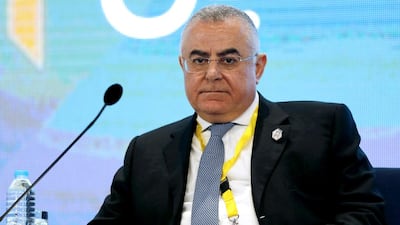One year ago, Hisham Ramez, the Egyptian central bank governor at the time, took the stage at the Egypt The Future economic development conference in Sharm El Sheikh, aimed at kick-starting the North African state’s ailing economy, and delivered a statement that was meant to signal a breakthrough in the government’s efforts to tackle an overvalued currency and a scarcity of US dollars.
“There’s no black market [in foreign exchange] any more,” Mr Ramez told business and political leaders at the conference, which included the IMF’s managing director Christine Lagarde and the UAE Minister of State, Sultan Al Jaber, and resulted in the signing of US$36 billion in investment deals.
But in the 12 months since Mr Ramez’s remarks, the black market has proved hard to kill as Egyptian businesses have been hobbled by shortages of foreign exchange, which has in turn slowed the growth of the economy.
General Motors was forced to briefly shut down operations in the country in February after dollar shortages. In September, Ghabbour Autos, Egypt’s largest car distributor, stopped production for 20 days because it couldn’t get the foreign currency needed to buy parts from abroad.
Samsung said it was unable to repatriate profits because of the dollar squeeze.
Egypt’s foreign reserves fell to $16.4bn in September which is the minimum the IMF considers advisable as direct foreign investment, portfolio investment and tourism receipts have all declined.
“The challenges facing the Egyptian banking sector are obvious to everyone. The most important of these is the scarcity of foreign currency,” Ahmed Ismail Hassan, the chief executive of National Bank of Abu Dhabi’s Egypt operation, told The National this month.
“Foreign currency is needed by almost everyone to grow and import their raw materials.”
Although official data indicates that Egypt’s economy grew by 4.2 per cent in 2015, rapid population growth and high, entrenched inflation mean that official figures betray real-terms declines in living standards.
“2015 has been a struggle [for Egyptians],” says Jason Tuvey, an emerging markets economist at Capital Economics. “There isn’t enough private capital coming into the country.”
Analysts were excited by the appointment of Tarek Amer, the former chairman of National Bank of Egypt, as Mr Ramez’s replacement in October, seeing it as a sign that Egypt may move away from its defence of the Egyptian pound. And in August, the president Abdel Fattah El Sisi inaugurated the Suez Canal extension, dug in record time, which is expected to bring in more vital foreign currency as well as billions in inward investment as the area around the key trade route is built up.
However, when Metrojet Flight 9268 exploded in midair over the Sinai Peninsula in October, the country’s tourist industry, which served as Egypt’s largest single source of foreign exchange in 2014, was dealt a major blow at a critical time for the government’s efforts to boost the economy.
The crash and subsequent flight of tourists from the resort came just days after the African Development Bank and the government of Egypt signed a loan agreement for $50 million. The deal, along with the earlier loan agreements of $90m from the bank and $1.8m grant from the Middle Income Countries Technical Assistance Fund, were earmarked for the Sharm El Sheikh airport development. The airport, which before the crisis handled 10 million a passengers a year, aims to handle 18 million passengers a year by 2025.
But then, Russia and the UK, Egypt’s two largest tourist source markets, suspended flights to the country amid concerns about lax security procedures at Sharm’s airport. Countrywide revenues from tourism fell 22.5 per cent in 2015 against the previous year, the research firm IHS estimates. Occupancy rates in Sharm plunged to 22.4 per cent in January, compared to 55.7 per cent a year earlier, according to Hotstats data.
“Hotels in Cairo have reported marginally better performance this year, primarily on the back of continued demand from corporate and [meetings, incentives, conferences, and exhibitions] segments,” says Rashid Aboobacker, the associate director of TRI Consulting in Dubai. “The outlook for Sharm El Sheikh is significantly negative.”
Meanwhile, the momentum that was built in real estate through the announcement at the Sharm conference of the $300bn The Capital Cairo project headed by a group of investors led by the Emaar Properties chairman Mohamed Alabbar, also stalled amid security concerns and construction delays.
Ayman Sami, the head of JLL Mena’s office, says that while Cairo’s real estate market enjoyed a strong first half of 2015, “a combination of economic, political and security uncertainties have taken some of the steam out of this growth, and the market has generally cooled over the past few months”.
Egypt’s finance ministry is drawing up a budget that assumes a devalued pound, and last week the central bank relaxed of controls on corporate and individual withdrawal of foreign exchange from banks in the hope of improving liquidity and narrow the gap between the black market and official rates. The government is also reportedly planning to launch an option product that allows foreign investors to hedge against currency risk.
business@thenational.ae
Follow The National's Business section on Twitter

